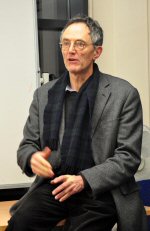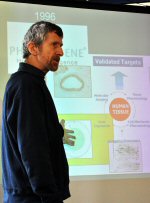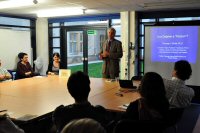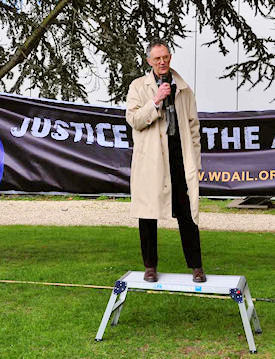Previous Events
View Michaelmas Term 2012
View Hilary Term 2011
View Michaelmas Term 2010
Hilary Term 2010
 Our first event of the term, on 28 January, was a talk given by Dr Matthew Simpson,
entitled 'Goodbye, Slade Professor: the Story of John Ruskin's Resignation'. In biographies and
other writings about Ruskin, the abrupt ending in 1885 to his many years as a brilliant and popular
Professor of Fine Art at Oxford has commonly been attributed to failing mental health, while Ruskin's
own explanation - that he refused to serve an institution which sponsored vivisection, as Oxford had
now decided to do - has been regarded as a pretext or impulsive gesture only. Dr Simpson showed that
Ruskin had in fact been trying, from his earliest lectures onward, to correct modern science's
reductive, mechanistic interpretation of the natural world, which he believed was progressively
alienating humankind from our proper place within the life of the planet. For a man who taught that
both art and science should be premised on love and reverence for life, the coming of vivisection to
Oxford seemed to nullify everything he had been trying to achieve there, and his resignation was an
emphatic public statement to that effect.
Our first event of the term, on 28 January, was a talk given by Dr Matthew Simpson,
entitled 'Goodbye, Slade Professor: the Story of John Ruskin's Resignation'. In biographies and
other writings about Ruskin, the abrupt ending in 1885 to his many years as a brilliant and popular
Professor of Fine Art at Oxford has commonly been attributed to failing mental health, while Ruskin's
own explanation - that he refused to serve an institution which sponsored vivisection, as Oxford had
now decided to do - has been regarded as a pretext or impulsive gesture only. Dr Simpson showed that
Ruskin had in fact been trying, from his earliest lectures onward, to correct modern science's
reductive, mechanistic interpretation of the natural world, which he believed was progressively
alienating humankind from our proper place within the life of the planet. For a man who taught that
both art and science should be premised on love and reverence for life, the coming of vivisection to
Oxford seemed to nullify everything he had been trying to achieve there, and his resignation was an
emphatic public statement to that effect.
Our next two events, on 8 and 22 February, continued the lunchtime lecture format begun the previous term. These talks are aimed primarily at a scientific audience, and seek to highlight the latest developments in non animal-based research.
 Dr Candida Nastrucci, a scientist experienced in alternatives who gained her DPhil in
Clinical Biochemistry here at Oxford, gave a first-hand account of the 7th World Congress on
Alternatives & Animal Use in the Life Sciences, held in Rome at the end of last summer. Organised
every 2-3 years, this event brings together the international animal welfare community and leading
scientists from governments, academia and industry. 50 years on from the introduction of the "3Rs"
concept, the 2009 Congress embraced current developments in regulatory safety testing in the US, Europe
and Japan and called for a strategy of global collaboration which could make the use of experimental
animals completely redundant within 20 years. This was very heartening to hear, but must be balanced
against the much slower progress in the field of basic research, which is still the largest consumer
of animals. The next Congress is due to take place in Canada in August 2011.
Dr Candida Nastrucci, a scientist experienced in alternatives who gained her DPhil in
Clinical Biochemistry here at Oxford, gave a first-hand account of the 7th World Congress on
Alternatives & Animal Use in the Life Sciences, held in Rome at the end of last summer. Organised
every 2-3 years, this event brings together the international animal welfare community and leading
scientists from governments, academia and industry. 50 years on from the introduction of the "3Rs"
concept, the 2009 Congress embraced current developments in regulatory safety testing in the US, Europe
and Japan and called for a strategy of global collaboration which could make the use of experimental
animals completely redundant within 20 years. This was very heartening to hear, but must be balanced
against the much slower progress in the field of basic research, which is still the largest consumer
of animals. The next Congress is due to take place in Canada in August 2011.
 As a pharmacologist who worked for 30 years for the Glaxo group of companies before founding
Pharmagene, the first drug discovery and development company to work exclusively on human
biology, Dr Bob Coleman was able to give us an expert insight into the use of human
tissue in research. Though not an anti-vivisectionist himself, he pointed to the lack of human
relevance of much animal work, and outlined some promising advances in human-tissue based
techniques, such as 3D cell culture and microfluidic chips designed to mimic whole body systems. The
barriers to a more wide-scale adoption of this approach appear to be administrative rather than
scientific: until it becomes a regulatory requirement, industry will be slow to get on board. And the
fact that the human tissue available in the UK is currently sourced almost exclusively from surgical
and post-mortem material means that it is necessarily limited in range, quantity, quality and
availability. The best source is that of heart-beating organ donors (e.g. accident victims): there
is therefore an urgent need for industry and the NHS to work together, and for a public information
campaign to encourage the donation of tissue for research (currently requiring specific consent from
the family of the deceased) as well as organs for transplant.
As a pharmacologist who worked for 30 years for the Glaxo group of companies before founding
Pharmagene, the first drug discovery and development company to work exclusively on human
biology, Dr Bob Coleman was able to give us an expert insight into the use of human
tissue in research. Though not an anti-vivisectionist himself, he pointed to the lack of human
relevance of much animal work, and outlined some promising advances in human-tissue based
techniques, such as 3D cell culture and microfluidic chips designed to mimic whole body systems. The
barriers to a more wide-scale adoption of this approach appear to be administrative rather than
scientific: until it becomes a regulatory requirement, industry will be slow to get on board. And the
fact that the human tissue available in the UK is currently sourced almost exclusively from surgical
and post-mortem material means that it is necessarily limited in range, quantity, quality and
availability. The best source is that of heart-beating organ donors (e.g. accident victims): there
is therefore an urgent need for industry and the NHS to work together, and for a public information
campaign to encourage the donation of tissue for research (currently requiring specific consent from
the family of the deceased) as well as organs for transplant.
 Finally, on 24 March, VERO joined the University's Animal Ethics Society to host a talk
by Professor Thomas White on the theme 'Are Dolphins Persons?' Professor White is
Director of the Centre for Ethics and Business at Loyola Maryland University, Los Angeles, and the
author of In Defence of Dolphins. He introduced us to the skills and virtues of these
extraordinary animals, so much more ancient as a species than man:
their perceptive powers, curiosity, ingenuity, insight, self-awareness, and keen sociability. These and
other qualities might well be considered to constitute "personhood", but Professor White expressly
recognised the limitations of that concept and its anthropocentric bias. He suggested, in fact, that
the "socialised intelligence" of dolphins might properly be treated as an instructive example to our
wn more technological mentality, rather than patronised as a rough approximation to it. This was a
very well-attended and compelling talk, by a man with a rare combination of scientific and
philosophical understanding.
Finally, on 24 March, VERO joined the University's Animal Ethics Society to host a talk
by Professor Thomas White on the theme 'Are Dolphins Persons?' Professor White is
Director of the Centre for Ethics and Business at Loyola Maryland University, Los Angeles, and the
author of In Defence of Dolphins. He introduced us to the skills and virtues of these
extraordinary animals, so much more ancient as a species than man:
their perceptive powers, curiosity, ingenuity, insight, self-awareness, and keen sociability. These and
other qualities might well be considered to constitute "personhood", but Professor White expressly
recognised the limitations of that concept and its anthropocentric bias. He suggested, in fact, that
the "socialised intelligence" of dolphins might properly be treated as an instructive example to our
wn more technological mentality, rather than patronised as a rough approximation to it. This was a
very well-attended and compelling talk, by a man with a rare combination of scientific and
philosophical understanding.
